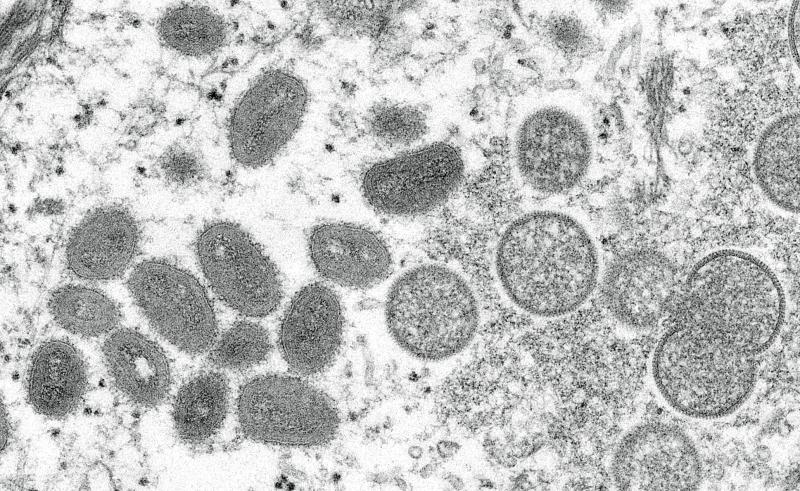Taiwan yesterday reported its first case of monkeypox, a man who recently returned from Germany.
On Monday, four days after his return, the man developed a fever, a sore throat, muscle pain, swollen lymph nodes and a rash, the Centers for Disease Control (CDC) said in a statement.
He sought medical attention two days later, and his case was reported to the CDC as a suspected monkeypox infection, the CDC said, adding that his test results returned earlier yesterday.

Photo: Reuters
The man, who had been studying in Germany, is quarantining in hospital, the agency said.
The health conditions of five listed contacts — three medical workers and two of his relatives — are being monitored, CDC Deputy Director-General Chuang Jen-hsaing (莊人祥) said.
The CDC is to notify the WHO of the nation’s first recorded case of monkeypox, he said.
The CDC on Thursday designated monkeypox a category 2 communicable disease, citing its global spread.
The designation means that physicians are required to report confirmed or suspected cases to the CDC within 24 hours. Other category 2 communicable diseases are dengue fever, Zika fever, typhoid fever, measles and Chikungunya fever.
The CDC on Thursday said it had ruled out another suspected monkeypox case of a man in his 60s that was reported last week.
The disease is caused by the monkeypox virus, which can spread through close contact with an infected animal or person, and transmission occurs through direct contact with the infectious rash, scabs, body fluids or materials contaminated with the virus.
Since the UK first reported monkeypox cases in the middle of last month, at least 3,598 cases have been confirmed in 50 states around the world, mostly in Europe and the Americas, the CDC said.
Taiwan is the third Asian country that has reported the disease, following cases in Singapore and South Korea, the CDC said.

AGING: As of last month, people aged 65 or older accounted for 20.06 percent of the total population and the number of couples who got married fell by 18,685 from 2024 Taiwan has surpassed South Korea as the country least willing to have children, with an annual crude birthrate of 4.62 per 1,000 people, Ministry of the Interior data showed yesterday. The nation was previously ranked the second-lowest country in terms of total fertility rate, or the average number of children a woman has in her lifetime. However, South Korea’s fertility rate began to recover from 2023, with total fertility rate rising from 0.72 and estimated to reach 0.82 to 0.85 by last year, and the crude birthrate projected at 6.7 per 1,000 people. Japan’s crude birthrate was projected to fall below six,

Conflict with Taiwan could leave China with “massive economic disruption, catastrophic military losses, significant social unrest, and devastating sanctions,” a US think tank said in a report released on Monday. The German Marshall Fund released a report titled If China Attacks Taiwan: The Consequences for China of “Minor Conflict” and “Major War” Scenarios. The report details the “massive” economic, military, social and international costs to China in the event of a minor conflict or major war with Taiwan, estimating that the Chinese People’s Liberation Army (PLA) could sustain losses of more than half of its active-duty ground forces, including 100,000 troops. Understanding Chinese

SELF-DEFENSE: Tokyo has accelerated its spending goal and its defense minister said the nation needs to discuss whether it should develop nuclear-powered submarines China is ramping up objections to what it sees as Japan’s desire to acquire nuclear weapons, despite Tokyo’s longstanding renunciation of such arms, deepening another fissure in the two neighbors’ increasingly tense ties. In what appears to be a concerted effort, China’s foreign and defense ministries issued statements on Thursday condemning alleged remilitarism efforts by Tokyo. The remarks came as two of the country’s top think tanks jointly issued a 29-page report framing actions by “right-wing forces” in Japan as posing a “serious threat” to world peace. While that report did not define “right-wing forces,” the Chinese Ministry of Foreign Affairs was

US President Donald Trump in an interview with the New York Times published on Thursday said that “it’s up to” Chinese President Xi Jinping (習近平) what China does on Taiwan, but that he would be “very unhappy” with a change in the “status quo.” “He [Xi] considers it to be a part of China, and that’s up to him what he’s going to be doing, but I’ve expressed to him that I would be very unhappy if he did that, and I don’t think he’ll do that. I hope he doesn’t do that,” Trump said. Trump made the comments in the context